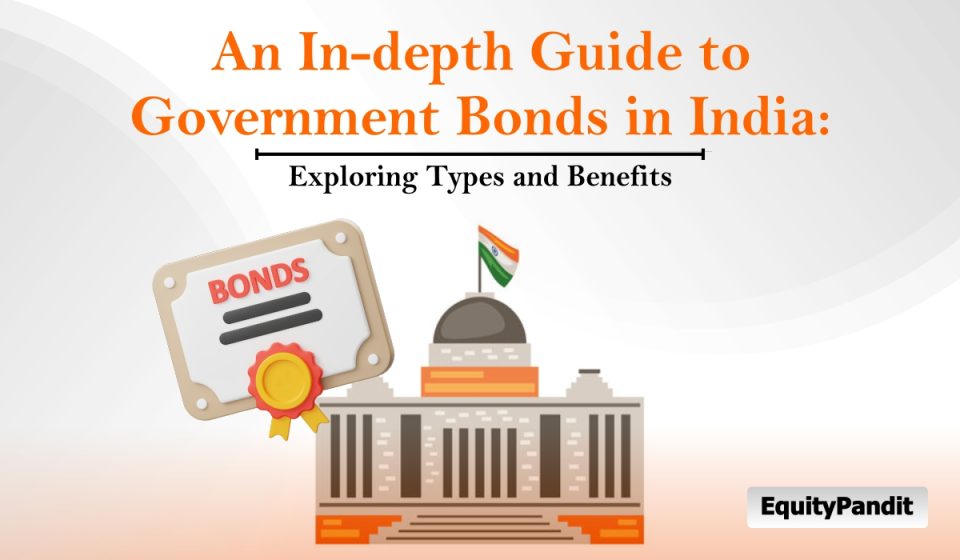What are Government bonds?
Government bonds, also known as G-Secs or Government Securities, are debt securities issued by the central and state governments of India. These bonds raise money from the public to cover budget deficits and finance infrastructure projects.
Government of India bond is a legal contract between the issuer and the investor. It has a fixed interest rate and a fixed term. Investors receive regular interest payments on the face value of the bond until maturity.
Government bond investments are generally considered low-risk investments because they are guaranteed by the issuing government. They have different maturity periods, with a fixed interest rate, and can be bought and sold in the secondary market as well.
Why should you invest in government bonds?
There are several reasons why you should invest in Government Bonds or Government Securities. Some of them are given below:
• If an investor is looking for a long-term investment, G-sec is ideal as it is available with a maturity period of up to 40 years.
• Apart from the appreciation of the capital after the maturity of the bond, it also provides regular income in the form of interest, also known as coupon payments.
•G-secs offer different investment periods from 91 days to 40 years to match the duration of different liability structures of different institutions and the risk appetite of the investors.
• They are issued in both electronic and physical form.
• G-secs can also be sold on the secondary market if needed.
• G-sec can also act as collateral for equal rights claims.
• TDS is not deducted from the interest income earned.
• They are traded in huge volumes in the secondary market, which means they are more liquid than some of the other investment options.
But, apart from that investors should also consider the other side of the coin before investing. This includes low rate of return, interest rate risk, inflation risk, market volatility, etc.
How do you invest or buy a Government Bond or Government securities in India in 2024?
1) Primary Auctions:
When new bonds are released by the government, it holds primary auctions to sell these bonds directly to investors. Investors can participate in these auctions through various channels, including:
a. Banks:
Most banks in India offer the facility to buy government bonds for their customers. You can approach your bank branch or use their online platform to place a bid in the primary auction. Your bank can provide you with guidance and assistance in the bidding process.
b. Primary Dealers (PDs):
Primary Dealers are financial institutions authorized by the Reserve Bank of India (RBI) to participate directly in government securities auctions. They act as market makers and underwriters for government bonds. Retail investors can also approach these PDs to submit bids in the primary auctions, and they may provide additional information and support for the auction process.
c. Indian Stock Exchanges:
Retail investors can participate in the primary auctions through the National Stock Exchange (NSE) and Bombay Stock Exchange (BSE) platforms. Ensure you possess a trading account with an authorised broker and adhere to the auction bidding procedure. These platforms may offer educational resources and tools to assist investors in placing bids effectively.
2) Secondary Market:
After the initial offering, government bonds are traded in the secondary market. The secondary market offers investors the opportunity to purchase and sell previously issued bonds. The following outlines the process for purchasing government bonds in the secondary market:
a. Stock Exchanges:
Government bonds are listed on stock exchanges like the National Stock Exchange (NSE) and Bombay Stock Exchange (BSE). Investors can place buy orders through their trading accounts with registered brokers. The stock exchanges and brokers provide trading information, historical data, and market analysis to help investors make informed decisions.
b. Electronic Trading Platforms:
Some banks and financial institutions offer online platforms where you can buy government bonds in the secondary market. These platforms may provide real-time pricing, research tools, and access to market experts for investors.
c. Bond Funds/GILT Mutual Funds:
Investing in bond funds or mutual funds that mainly consist of government bonds is another method of indirectly investing in government bonds. This allows you to invest in a diversified bond portfolio managed by professional fund managers. These funds provide detailed information about their holdings and performance to help investors evaluate their investment choices. You can contact your Bank or financial institution to invest in GILT Mutual Funds.
3) Retail Direct:
In recent years, the RBI has introduced the “Retail Direct” framework to allow individual investors or retail investors to directly participate in the primary market auctions for government securities. This initiative seeks to make government bonds more accessible to regular or retail investors. Investors can engage with the RBI’s Retail Direct platform to access information about upcoming auctions, submit bids, and track their investments more conveniently. This initiative may come with educational resources and support to assist retail investors in understanding and participating in government bond auctions.
Types of Government Bonds in India in 2024
There are majorly three types of Government Bonds in India. These include the following.
1) Dated Government Securities
Dated Government Securities (G-Secs) are long-term financial instruments issued by the Government of India to raise funds. These securities come with fixed or floating interest rates and have tenures ranging from 5 to 40 years. Investors receive interest payments on the face value, usually every six months. Some examples of Dated Government Securities include – Floating Rate Bonds (FRBs), Fixed Rate Bonds (FRBs), Inflation-Indexed Bonds, Sovereign Gold Bonds, 7.75% GOI Savings Bond, and Zero-Coupon Bonds. They are considered relatively safe investment options as they are backed by the Indian government.
a) Fixed-Rate Bonds:
These government bonds have an interest rate that stays the same throughout the bond’s term, providing predictable returns. Investors receive regular interest payments, usually every six months or once a year, as well as the principal amount when the bond matures.
b) Floating Rate Bonds:
These bonds have interest rates that change based on a benchmark rate, causing the interest payments to vary over time. This setup can protect against sudden interest rate increases but may introduce some uncertainty in the income stream. The interest rate on the Government of India Floating Rate Bond 2024 which is applicable for the half-year period from May 07, 2024, to November 06, 2024, will be 7.03% per year.
c) Inflation-Indexed Bonds:
These bonds are designed to protect investors from inflation by adjusting the interest rate to match the inflation rate. Both the interest payments and the principal amount paid at maturity are affected by inflation, preserving the purchasing power of the bond.
d) Sovereign Gold Bonds:
These bonds, issued by the Indian government, allow investment in gold without owning physical gold. Investors receive regular interest payments, and the final payout is based on the average gold price in the three days prior to maturity. Additionally, investors may benefit from capital appreciation if the gold price rises.
e) 7.75% GOI Savings Bond:
This bond, issued by the Government of India, offers a fixed annual interest rate of 7.75%, paid every six months. With a 7-year term, it provides a relatively high and steady interest rate compared to other fixed-income products. It is backed by the government for added security and dependability.
Investing in these bonds requires contacting a bank and going through the verification process using Aadhar and PAN cards.
f) Zero-Coupon Bonds:
These bonds are sold at a discount to their face value and do not pay regular interest. Instead, interest accumulates and is compounded until maturity, when the investor receives the full face value of the bond. They are suitable for investors looking for a lump sum at a later date.
2) Treasury bills
Treasury bills, also known as T-bills, are short-term financial instruments issued by the government to borrow money for a short term. They are considered one of the safest investments with high liquidity and are issued at discounted prices and redeemed at a higher value at maturity. They are low-risk instruments and come in four types based on their tenures. T-bills have fixed terms which are provided for – 14 days, 91 days,
182 days, and 364 days. They are also called zero-coupon debt instruments, meaning they do not provide interest income but instead offer capital appreciation. T-bills are issued through auctions conducted by the Reserve Bank of India, and the minimum investment amount is Rs. 10,000, with multiples of Rs. 10,000 for higher investments. Treasury bills are primarily used to meet the short-term financial requirements of the government.
3) Cash Management Bills (CMBs)
Cash Management Bills (CMBs) were introduced in 2010 by the Reserve Bank of India (RBI) as a part of its liquidity management operations. CMBs are short-term debt instruments with maturity periods of less than 91 days, similar to Treasury bills (T-bills). However, unlike T-bills, CMBs are not auctioned regularly. They are issued by the RBI to address temporary imbalances in the government’s cash flows, providing a tool for the government to manage its short-term funding needs efficiently.
Ready to invest like a pro? Unicorn Signals app equips you with 100+ Free tools and knowledge you need to succeed. Download Unicorn Signals app and gain access to daily trading signals, insightful market analysis and many more features!
Frequently Asked Questions (FAQs)
What is the minimum investment in government bonds?
It depends on the type of government bond you are investing in. For RBI floating rate bonds, GOI Savings bonds, etc. it is Rs 1000.
Is there any maximum limit for investing in Government Bonds in India in 2024?
No, there’s no maximum limit to invest in the Government Bonds in India in 2024.
Is the income earned from the Government Bonds taxable for an Investor?
An investor is taxable on the interest earned on the Government bond/s, as per the income tax bracket applicable to the investor.
Is TDS applicable on the Government Bonds?
No, the Tax Deduction Source (TDS) component is not deducted from the interest income received from the Government Bonds in India in 2024.







